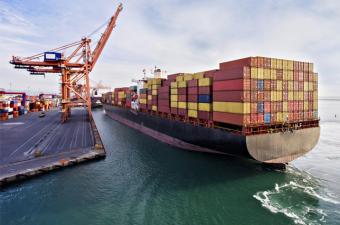
OVERVIEW
Apportionment of liability under Clause 8(b) of the Inter-Club Agreement and amendments “similar” to adding “and responsibility”
Agile Holdings Corporation v Essar Shipping Ltd [2018] EWHC 1055 (Comm)
Under Clause 8(b) of the Inter-Club Agreement charterers are 100% liable for cargo claims arising from the handling of cargo unless the familiar words ‘and responsibility’ have been added to clause 8 of the NYPE or there has been a ‘similar amendment making the Master responsible for cargo handling’ in which case liability is apportioned 50/50 with owners. The issue that arose in Agile Holdings Corporation v Essar Shipping Ltd [2018] EWHC 1055 (Comm) was what constitutes a ‘similar amendment’ for the purposes of that proviso? Is it sufficient that responsibility for some aspects of cargo handling has been transferred to the owners or does the amendment need to achieve the same outcome as the addition of the words ‘and responsibility’, namely the total transfer of responsibility for cargo handling?
Allowing an appeal from an arbitration award under s.69 of the Arbitration Act 1996, HHJ Waksman QC (sitting as a Judge of the High Court) held that nothing but a total transfer of responsibility is sufficient. In a judgment handed down on 11 May 2018 he rejected the proposition that apportionment under the ICA requires a factual enquiry as to (i) what aspect of cargo handling has caused a particularly loss; and (ii) whether responsibility for that aspect has been transferred to the owners. In reaching that conclusion he reaffirmed that a mechanistic and simple approach should be taken to apportionment under the ICA.
Leave to appeal was refused
Simon Rainey QC, leading Peter Stevenson, represented the successful appellant.
The Background
The underlying arbitration concerned a dispute between Agile Holdings Corp, the owners of the vessel ‘Maria’ and Essar Shipping Ltd, her charterers under a time charter on an amended NYPE ’46 form for a single trip Trinidad to India carrying a cargo of direct reduced iron (‘DRI’).
DRI is reactive and combustible in the presence of heat or water. In the course of loading the cargo onto the vessel at Port Lisas, Trinidad, a fire was observed on the loading belt. However the appointed supercargo inspected the holds and advised that loading could continue. In fact some of the DRI loaded on board was still on fire and upon discharge, the cargo interests, Essar Steel Limited (an associated company of the charterer) brought a claim against the owners.
Agile commenced arbitration arguing that the cause of the cargo claim was the manner in which the DRI had been handled during loading and sought a declaration that Essar was obliged to indemnify it under Clause 8(b) of the ICA.
Clause 8(b) of the ICA provides:
(b) Claims in fact arising out of the loading, stowage, lashing, discharge, storage or other handling of cargo: 100% Charterers unless the words “and responsibility” are added in clause 8 [of the NYPE form] or there is a similar amendment making the Master responsible for cargo handling in which case: 50% Charterers 50% Owner
The charter between Agile and Essar was on the NYPE ’46 form but the words ‘and responsibility’ had not been added to clause 8. Rather, it contained the following familiar provisions dealing with cargo handling:
“… Charterers are to load, stow, and trim, tally and discharge the cargo at their expense under the supervision of the Captain…”
It was common ground that the effect of this provision was to reverse the common law position and shift responsibility for all aspects of cargo handling onto charterers (per Court Line v. Canadian Transport (1940) 67 Ll. L. Rep. 161).
The Tribunal (Mr Alan Oakley, Mr Michael Baker-Harber and Mr Robert Thomas QC) agreed with Agile that the cause of the cargo claim was the manner in which the cargo had been handled and thus liability fell to be apportioned under clause 8(b) of the ICA. However it refused to declare Essar 100% liable because, although the words ‘and responsibility’ had not been added to clause 8, a similar amendment had been made by the parties in clause 49.
Clause 49 provided:
The Stevedores although appointed and paid by Charterers/Shippers/Receivers and or their Agents, to remain under the direction of the Master who will be responsible for proper stowage and unseaworthiness and safety of the vessel…”
The Tribunal construed this clause as making the Master responsible for part (at least) of the loading process and held that this was sufficient to trigger the proviso to clause 8(b) and lead to a 50/50 apportionment between the parties.
The s.69 Appeal
The addition ‘and responsibility’ to clause 8 of the NYPE restores the common law position and makes a shipowner responsible for all aspects of cargo handling (The Shinjitsu Maru No 5 [1985] 1 Lloyd’s Rep 568.
On the appeal Agile argued that in order for an amendment to be ‘similar’ to the addition of ‘and responsibility’ to clause 8 it needed to have the same effect, i.e. it needed to effect a total transfer of responsibility for cargo handling and not merely a partial transfer.
Essar rejected that analysis. It argued that a ‘similar amendment’ for the purposes of Clause 8(b) was one that transferred responsibility for the relevant aspect of cargo handling. The relevant aspect of cargo handling in any case was said to be the aspect of cargo handling that caused the cargo claim, i.e. if the claim arose from the manner in which loading had been effected and responsibility for loading had been transferred to owners, the proviso to Clause 8(b) was triggered and charterers would not be 100% liable.
As an alternative to its primary position, Agile argued that, if Essar’s analysis were correct, clause 49 nonetheless did not trigger the proviso to Clause 8(b) since, contrary to the construction given to it by the Tribunal, the clause merely transferred responsibility for stowage leading to unseaworthiness and not stowage resulting in cargo damage.
The appeal thus gave rise to two issues
- Whether a ‘similar amendment’ under Clause 8(b) requires a total transfer of responsibility for cargo handling to owners; and
- Whether, on its true construction, clause 49 transferred responsibility for cargo handing operations at all or whether it was concerned exclusively with stowage affecting seaworthiness.
The Judge agreed with owners on both issues and ruled that the Tribunal had erred.
Issue 1: What is a ‘similar amendment’
Agile argued that the ICA, as originally drafted, was intended to create a simple and mechanistic regime for apportioning cargo claims in which liability for claims arising from unseaworthiness were for owners’ account and, subject to a limited exception, liability for claims arising from cargo handling were for charterers’ account.
That limited exception was where the parties had agreed, by the insertion of the words ‘and responsibility’ to clause 8, that all cargo handling operations were to be the responsibility of the owners. In that case, although cargo handling would be the sole responsibility of owners, liability for cargo claims arising from cargo handling would be divided 50/50.
Although this proviso to the clause had been extended in the 1996 version of the rules to cover ‘similar amendments’, the purpose of that change was not to alter the basic apportionment regime but merely to ensure that, where the parties had altered the cargo handling provisions of a charter to achieve the same effect (i.e. the total transfer of responsibility for cargo handling to owners) but by different words, charterers would not remain solely responsible for claims.
The Judge agreed with this analysis. He held that it accorded with (i) the natural meaning of the words used; and (ii) the purpose of the agreement.
In respect of the former, he agreed that the word ‘similar’ in Clause 8(b) was intended to connote a provision in the charter party which is of the same kind or is to the same effect as the addition of the words ‘and responsibility’ and not merely ‘alike but not identical’ as was contended by Essar. He drew support for that conclusion from the fact that (i) on Essar’s construction the word ‘similar’ could be deleted from the clause without altering its meaning; and (ii) the use of the same phrase in clause 4(b) of the ICA to connote an amendment making liability for cargo claims ‘clear’.
In respect of the latter, he held that Essar’s construction would require a two stage factual enquiry before liability could be allocated. First, it would be necessary to determine whether a claim arose from cargo handling (rather than another cause covered by the ICA) and, second, what aspect of cargo handling caused the claim. The Judge concluded that there was nothing in the wording of the ICA which suggested that such a detailed enquiry of facts which may be in serious dispute was intended and it was inconsistent with the simple approach to allocation that underpins the ICA.
Having reached these conclusions the Judge rejected the proposition that a strict reading of the ICA would lead to anomalous results such as charterers being held 100% liable for cargo claims when responsibility for all but a tiny aspect of cargo handling had been transferred to owners. He held (a) having regard to the usual forms of cargo handling such a scenario was highly unlikely to occur and (b) if there could be such an extreme case a de minimis exception might apply
Issue 2: Proper construction of clause 49
Having reached these conclusions it was not strictly necessary for the Judge to consider the proper construction of clause 49 (it being common ground that it did not effect a total transfer of responsibility for cargo handling to owners).
Nonetheless he agreed with owners that the likely purpose of clause 49 was to reverse the effect of the well known decision of Langley J in The Imvros [1999] 1 Lloyd’s Rep 848 so as to make owners responsible for stowage insofar as it affects the seaworthiness of the vessel. It did not transfer responsibility for stowage generally.
Conclusions
The decision of the Judge is to be welcomed as bringing clarity to a question which had been hitherto unaddressed in any reported case and for reinforcing the mechanistic and simple approach to apportionment under the ICA. It confirms that, when faced with a claim arising from cargo handling, owners and charterers (and their Clubs) do not need to undertake a detailed analysis of the precise cause of the loss or to trawl through the charterparty to ascertain if responsibility for any part of cargo handling has been transferred to the owners. Unless there is a clause (or clauses) which effect a total transfer of responsibility for cargo handling to owners they can be confident that cargo claims arising from the manner in which the cargo has been handled will fall 100% on the charterers.


